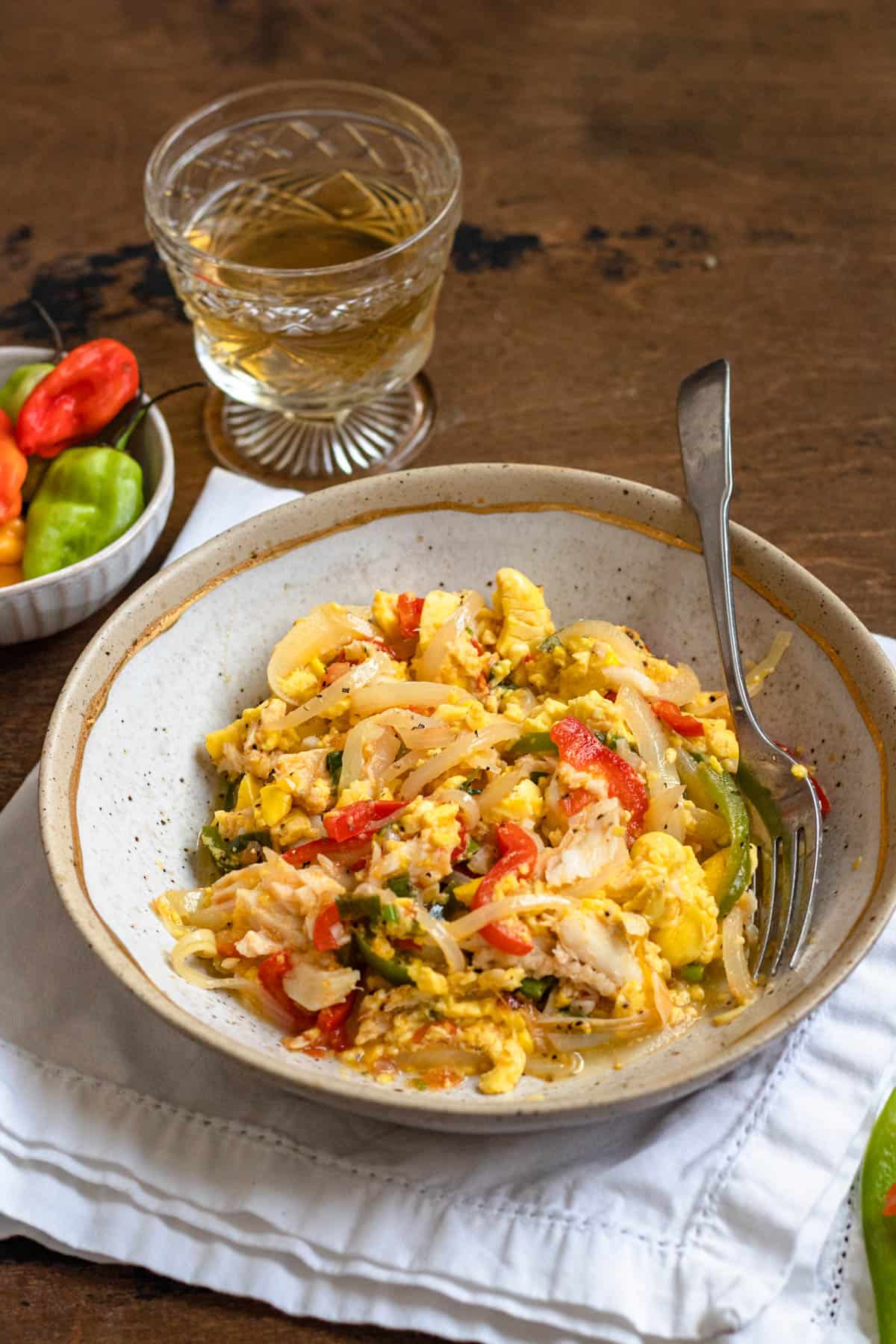
What Is Ackee and Saltfish?
-
Ackee (Blighia sapida) is a fruit native to West Africa but famously cultivated in Jamaica. Ackee is eaten when fully ripe: once the pods open naturally, exposing yellow arils (flesh) and seeds that must be discarded. Unripe ackee contains toxic compounds (hypoglycin A/B) causing “Jamaican vomiting sickness” if eaten improperly.
-
Saltfish refers usually to salted codfish. It has been preserved with salt so it has high sodium content but is a good source of protein, often serving as the fish component in this dish.
When cooked together with sautéed onions, peppers, tomatoes, herbs, and spices, Ackee and Saltfish becomes a flavorful, protein‑rich, and culturally meaningful meal.

Nutritional Profile: What You Get from a Serving
Here are approximate nutrition values and benefits of Ackee, Saltfish, and their dish together. Values vary based on portion size, preparation, and whether canned saltfish or fresh is used.
| Component | Key Nutrients in Ackee | Key Nutrients in Saltfish | Combined Dish Highlights |
|---|---|---|---|
| Calories & Macronutrients | Around 150 kcal per 100g of ripe ackee; high in healthy fats (≈ 15–18 g fat), moderate protein (~2.9‑3 g) and low sugars/carbs. | Very high in protein; low fat apart from what cooking adds; negligible carbs. | A balanced meal: good protein + healthy fats + some carbohydrates from vegetables etc. |
| Vitamins & Minerals | Excellent source of vitamin C, potassium, iron, calcium, B‑vitamins (niacin etc.). | Provides iodine, vitamin B12 (important for nerve function), possibly vitamin D depending on fish type. Also provides minerals like phosphorus. | |
| Fiber | Ackee offers dietary fiber (≈ 2‑4 g per 100g) which helps digestion. | Saltfish has little fiber. Combined meal benefits from ackee + added vegetables. | |
| Healthy Fats | Ackee contains unsaturated fats and essential fatty acids like linoleic acid (omega‑6), and small amounts of omega‑3 depending on preparation. Such fats are good for cardiovascular health. | The fat in saltfish or cooking oil adds flavor. But lighter fish options reduce saturated fat concerns. |
Health Benefits of Ackee and Saltfish
-
Heart Health
Ackee’s healthy unsaturated fats can help lower “bad” LDL cholesterol. Saltfish offers lean protein, which is important for muscle and tissue health without excess saturated fat if prepared properly. Potassium in ackee helps regulate blood pressure. -
Immune System Support
With high vitamin C from ackee, this dish contributes antioxidants that defend cells from damage, help wound healing, and keep the immune response strong. -
Muscle Repair & Growth
Saltfish is rich in high‑quality protein. Combined with ackee, which also provides some protein, the meal can support recovery after physical activity. -
Digestive Health
Dietary fiber from ackee helps promote regular bowel movements, reduce constipation, and improve gut health. -
Mineral Balance & Bone Health
Calcium, phosphorus, and iron in ackee help maintain healthy bones and blood. Saltfish adds selenium and possibly other minerals depending on type. -
Cultural, Psychological & Dietary Satisfaction
Beyond nutrients, this dish offers fullness and satisfaction, owing to its savory, fatty, and umami-rich profile. It is also culturally important in Jamaica, bringing psycho‑social comfort and identity. Eating foods that satisfy both taste and nutrition can help with dietary adherence.
Risks, Precautions & How to Maximize Benefits
While Ackee and Saltfish can be nutritious, there are some important warnings and best practices:
-
Toxicity of Unripe Ackee: Unripe ackee, its arils before the fruit naturally opens, or using seeds or pods can cause hypoglycin A poisoning (“Jamaican vomiting sickness”). Only eat ackee that has “yawned” (pods opened naturally).
-
High Sodium Content: Saltfish and added salt in cooking increase sodium intake. Excessive sodium can lead to hypertension, cardiovascular issues, or worsen kidney problems. Moderation is key.
-
Calorie Density: Because of the fats (both from ackee and added oils) and the protein, the dish has moderate‑high calories. If you are watching weight, balance with lower‑calorie sides and control portion size.
-
Allergies & Preservatives: Some salted fish may carry preservatives. Also, individuals allergic to fish should avoid saltfish.
To maximize benefits:
-
Use canned ackee (properly processed) when fresh ripe ackee is unavailable.
-
Soak saltfish well and rinse to reduce sodium.
-
Use healthier oils (e.g. olive oil) and add vegetables to increase fiber and reduce caloric concentration.
-
Serve with balanced sides (vegetables, legumes, whole grains).
Qualities That Make Ackee and Saltfish Unique
-
Flavor & Texture: Ackee has a creamy, buttery‑egg like texture with subtle nutty undertones. Saltfish brings firmness, saltiness, umami. Combination creates contrast in texture and flavor.
-
Cultural Heritage: More than a dish; it’s a symbol of Jamaica. Featured in festivals, family meals, breakfast tables. It embodies Jamaican history, resourcefulness, and identity.
-
Adaptability: Can be served for breakfast, lunch or brunch. Pair with sides like dumplings, rice & peas, plantains, vegetables. Can be spicy, mild, rich or lighter adaptation.
-
Visual Appeal: With color from peppers, onions, tomatoes, green herbs, the dish looks vibrant and appetizing — which helps in appetite stimulation and may improve eating experience.
SEO Keywords & Tags
To help this article be Google‑indexable and rank well, include keywords and tags like:
-
Ackee and Saltfish nutrition
-
Health benefits of Ackee
-
How to eat Ackee safely
-
Jamaican national dish
-
Benefits of saltfish protein
-
Ackee recipe
-
Balanced protein and healthy fats
-
Caribbean healthy foods
Meta description idea: “Discover the health benefits, nutrition facts, and safe preparation tips for Ackee and Saltfish—Jamaica’s flavorful, protein‑rich national dish.”
Conclusion
Ackee and Saltfish is more than just a traditional Jamaican meal; it is a powerful blend of nutrition, flavor, and culture. When prepared correctly—with ripe ackee, safely handled saltfish, and balanced cooking—it can offer many health benefits: from supporting heart health, boosting immunity, aiding digestion, to helping muscle repair.
By respecting its risks (toxicity in unripe ackee, high sodium in saltfish) and leveraging its nutritional strengths, this dish can be a delightful and nourishing addition to your diet. Whether you're enjoying it once in a while or making it a part of cultural exploration, Ackee and Saltfish deserves a place at your table.

You must be logged in to post a comment.